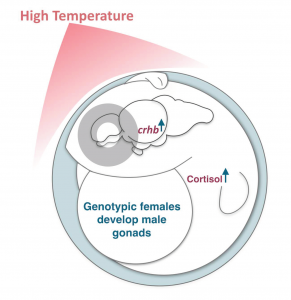New research uncovers how hot fish change sex
Posted by the Node, on 23 April 2019
Press release from Development. You can also read the Research Highlight for this article.
Researchers have identified the hormone that causes sex reversal of medaka fish growing in high temperatures. This study from the Instituto Tecnologico de Chascomus (INTECH) in Argentina is the first to report that the brain is involved in the masculinization of females, which has implications for fish populations as temperatures rise. The research has just been published in the scientific journal, Development.
Dr Juan Fernandino led the team investigating sex reversal, a phenomenon seen in some species whereby environmental conditions, such as high temperatures, cause genetically female fish to develop testes rather than ovaries. Now, researchers show for the first time that the brain can influence this process. “In the past, sex determination studies were specially focused on the gonad, probably because in genetic sex-determining genes are initially active in the gonad, driving the development of the testis,” explains Fernandino, “I was surprised at how long it took us to change our focus that sexual determination begins exclusively in the gonad.”

After identifying the hormone produced in fish growing in high temperatures, the researchers used CRISPR/Cas9 genome-editing technology to block the ability of cells to detect it. Importantly, this stopped genetic females developing into males, “I was happily surprised that using gene editing we obtained a complete suppression of masculinization induced by temperature” says Fernandino, “our results highlighted for the first time the participation of the brain as a transducer of environmental stressors, directing development of the testis in genotypic females.”
Identifying how sex reversal occurs has important implications for how some species of fish reproduce. Increasing temperatures and warmer waters might result in more male fish and fewer females. Not only would this affect the ability of fish to reproduce, but also the repercussions on fish populations might have knock-on effects for the ecosystem and fishing industry. “Understanding the molecular mechanisms behind heat-induced masculinization is of great importance for controlling sex ratios in aquaculture and to predict the potential effects of climate change in an important group of animals,” adds Fernandino.
The full study, “The central nervous system acts as a transducer of stress-induced masculinization through corticotropin-releasing hormone B” appears in the journal, Development.


 (5 votes)
(5 votes)